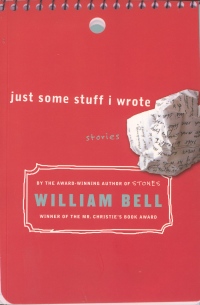| ________________
CM . . .
. Volume XII Number 10 . . . .January 20, 2006
excerpt:
It's a difficult matter to hit the right tone in YA writing - can you reflect the reality of the teenage world without condescension? Can you capture their fickle hearts? Will they pass the book from hand to hand saying, "You have to read this!"? In the case of Just Some Stuff I Wrote, the answers are yes, yes and yes. Some of the stories in this collection (“Beer Can Man” and “Apollo and Dionysos”) are traditional third person narrative, a form with which every student will be familiar. Others (“The Staircase” and “The Promise”) take the form of interviews and email messages, up-to-date, nonthreatening styles that teens will recognize as their own. Other stories (“Window Tree,” “Chumley” and “The ‘Scream’ School of Parenting”) are told in first person. The dialogue rings true in all the stories, and it is especially fine to hear the teenage voice, both out loud and internal, without the laziness of swearing that dominates alternative media. (Note to pop singers: not all teenagers use language to shock older people. Sometimes they think of brilliant ideas and new approaches and act on them.) But it is Bell's characters who will settle in the mind, striking a note of recognition and suggesting possibilities that students may try on and adopt. All those teens who feel that their parents don't have time for them will sigh in sympathy with Naomi in “The ‘Scream’ School of Parenting,” whose parents give her the same gift she received from them five months earlier. Many girls will sympathize with Shawna who falls in love with her teacher in “Window Tree” but will recoil in horror at her solution to her teacher's rejection. “Chumley” is the longest story, with a strong male protagonist, Victor, assigned as punishment to introduce a new student to his school. Victor's gradual acceptance of Chumley's differences and his silent sharing of Chumley's secret life (and thus his protection of his friend) are examples all students can take to heart. It's a tribute to Bell's fine writing that two characters, Mrs. Perkins in “The Leaves in the Country” and Albert's grandfather in “Beer Can Man,” although much older adults, will cause students to pause and think about how they treat the older people in their own lives. Although most of the stories are rooted in the real world, two of them (“The Promise” and “Apollo and Dionysos”) flirt with the creepy fog of the supernatural which many students find irresistible. The settings of the stories are rich and detailed, providing a complex background for the characters' actions. In a short paragraph, Bell brings alive the cheap, trailer-park lifestyle of Naomi's undesirable neighbours. Mrs. Perkin's warm, familiar kitchen reflects her self-satisfied, yet anxious life. Daniel is overcome with the heat, humidity and filth of Cuba in “Apollo and Dionysos.” Every student has been in Shawna or Victor's classroom, with the overwhelming boredom and tension. The cover image (a crumpled page of handwriting on a coil-bound notebook) and the title of the collection unfortunately suggest that Bell doesn't care about his writing. In an attempt to attract students who may themselves be writing and who may not yet realize that writing is craft, not just an outpouring of emotion, they imply that the contents are the careless drafts of a beginning writer. Nothing could be further from the truth. Highly Recommended. Joan Marshall is a retired high school teacher-librarian and currently a busy bookseller in Winnipeg, MB.
To comment
on this title or this review, send mail to cm@umanitoba.ca.
Copyright © the Manitoba Library Association. Reproduction for personal
use is permitted only if this copyright notice is maintained. Any
other reproduction is prohibited without permission.
NEXT REVIEW |
TABLE OF CONTENTS FOR THIS ISSUE
- January 20, 2006.
AUTHORS |
TITLES |
MEDIA REVIEWS |
PROFILES |
BACK ISSUES |
SEARCH |
CMARCHIVE |
HOME |
